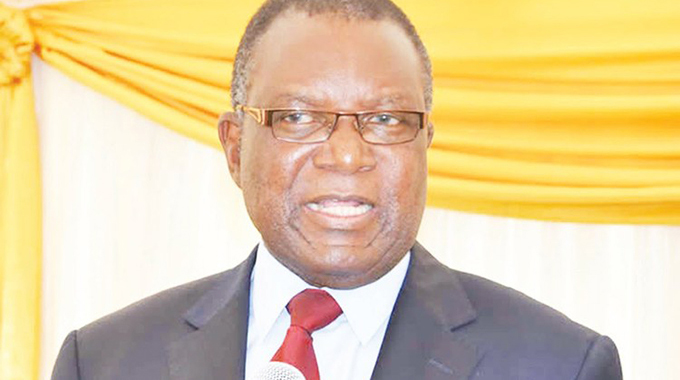NDS1 bearing fruit . . . as 3 000 projects are completed

Zvamaida Murwira
Senior Reporter
MORE than 3 000 projects across Zimbabwe have been implemented by Government over the past four years, transforming the lives of millions of people both in the rural and urban areas in line with the objectives of the National Development Strategy 1 (NDS1) enunciated by the Second Republic under the leadership of President Mnangagwa.
Projects range from community schemes with a huge impact on ordinary people to the flagship projects critical to the achievement of the vision of Zimbabwe becoming an upper middle income economy by 2030, resonating well with the mantra “leaving no one and no place behind”.
The Minister of State for Presidential Affairs in charge of Monitoring and Implementation of Government Programmes, Dr Jorum Gumbo, outlined the developmental projects being implemented by the Second Republic in an update.
“The advent of the Second Republic has, in a record short space of four years, seen the implementation of more than 3 000 life-changing projects that are designed to enhance the livelihoods of the citizenry.
“The projects are in tandem with the Second Republic’s mantra of leaving no one and no place behind. The initiatives vary in scope from community projects which are tailored to directly impact on the ordinary citizens and communities, to flagship projects that are critical to achieve the Vision of becoming an Upper Middle Income Society by 2030,” said Minister Gumbo.
“During the period 2018 to 2020, a total of 1 688 projects were implemented while in 2021 alone, 1 388 projects were implemented. A combined 1 523 projects were completed during the period 2018 to 2021. The projects are already yielding tangible benefits to the citizenry. Some of the long-term projects have recorded major milestones and citizens are already benefiting directly or indirectly.”
Beneficiaries of these people-centred projects cut across the social strata to include the general public; previously marginalised groups such as women, youths, and people living with disabilities and those with small to medium enterprises.
Other beneficiaries include learners in schools and higher and tertiary institutions, the infirm, farmers, artisanal miners, manufacturers and industrialists, country image advocates, and people affected by natural disasters and calamities such as cyclones.
Minister Gumbo said President Mnangagwa has fulfilled the pledge he made when he assumed office to repair and expand the physical and social infrastructure to position the country in readiness for economic growth and employment creation.
“This includes improving the transport sector through transforming the road network and the mass public transport system. In that regard, road trafficability for highly trafficked and feeder roads was improved through pothole patching, expansion and rehabilitation.
“Other benefits encompassed safe crossing of rivers to access socio-economic amenities such as schools, clinics, markets and service centres through bridge construction and modernised and rehabilitated ports of entry and exit. Businesses for local suppliers of goods and services were boosted as well as access to affordable transport,” he said.
Some of the notable projects include Harare-Masvingo-Beitbridge highway upgrading and widening, Harare Chirundu highway, and repair of Cyclone Idai induced damaged roads, said Minister Gumbo.
There was also the Emergency Road Rehabilitation Programme Phase One and Two countrywide that improved road infrastructure.
Other projects include mass public transportation that saw the recapitalisation and resuscitation of Zupco which now has 688 buses and 653 commuter omnibuses servicing communities with affordable fares, which private sector companies have been matching.
Ports of entry and exit rehabilitation saw
the implementation of the Beitbridge border post modernisation project.
Other projects include water and sanitation which saw borehole water drilling and roll out of the Presidential borehole water scheme.
Minister Gumbo said other projects include dam construction countrywide aimed at enhancing irrigation.
Government embarked on energy projects meant to increase power generation and electrification of 233 rural institutions.
Several mines have been reopened, others increased production, and new mines are now coming on stream in line with the desire to attain a US$12 billion mining economy by 2023.
Government also embarked on several youth and women empowerment projects which saw recapitalisation of empowerment institutions like Empowerment Bank, Women’s Bank while financial assistance has been extended in the form of loans.
Minister Gumbo said there have been social protection measures aimed at helping vulnerable persons that include provision of fees through BEAM, safe shelters for survivors of gender based violence, and other efforts.
Other projects are in the area of digital economy, access to the justice delivery system including construction of magistrate courts in high density suburbs, housing and health delivery including improved accommodation for Government employees and the general public and construction of more clinics.
There has also been establishment of community radio stations, engagement and re-engagement efforts to enhance the country’s attractiveness as a lucrative investment destination.
Other projects include the Mbudzi interchange, new Parliament building, Robert Gabriel Mugabe International Airport expansion and Muzarabani oil exploration.
“This is plausible progress considering that project implementation was plagued by Covid-19 induced disturbances, natural disasters in the form of floods and droughts, as well as volatile economic shocks characterised by, among other issues, the unjustified price escalations which eroded the value of budgets against a constrained fiscal environment,” Minister Gumbo said.










Comments